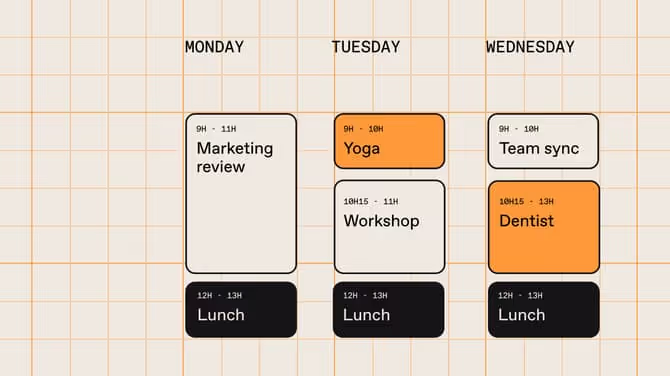How to avoid 5 mistakes new managers make

%20(1).png)
Starting out as a manager is a totally new experience, and because of that many first-time managers feel afraid of making mistakes.
This fear shows that you care, but making mistakes is a part of taking on a new challenge. As Ion Valis suggests in his book The Magnificent Mistake, it is "crucially important to learn from our mistakes." Messing up is a part of being human, and being human is a part of being a good manager.
As you become a manager, it’s inevitable that you will make mistakes. What's important is that you try to learn and grow from them when you do. It’s also great to be proactive in avoiding the mistakes that you can to set yourself up for success.
Here are some common mistakes that new managers make and tips on avoiding them.
[ov_cta id="5116566"]
5 mistakes new managers make and tips on how to avoid them
Focusing on details & micromanaging
As a manager, you need to look at the bigger picture of your employees’ projects and how they fit into the objectives of your team and company.
Especially if you’re making the shift from employee to manager, you’ll have to adjust from the more detail-oriented approach you took in your previous role. You might feel compelled to coach your employees through every step of their tasks—or worse, do their work for them.
As the leader of your team, your role is to guide your team by setting goals and aligning everyone to meet them. That means supporting your employees as they work towards the goals, but leaving how they get there up to them.
{highlight}
Tip: Have a team meeting early on to discuss collective goals and plan projects that align with those goals. This will get everyone on the same page and give you the confidence to take a step back and let your employees work autonomously.
{highlight}
Not seeing your employees as individuals
Your team works collaboratively towards common goals, but it’s still made up of individuals with unique skill sets and personalities. Each employee brings something different to the table, and together, they form your team.
{highlight}
Be mindful of the differences between your employees and avoid treating them all the same.
{highlight}
Look at the bigger picture when it comes to goals, but get to know your employees and their roles on a more individual basis. Not only do they all have different skills, they all have different needs and will seek different types of support from you.
{highlight}
Tip: Once you’ve met with your team as a group, meet with your employees one-on-one to discuss their individual tasks and work styles. Getting to know your employees on a more personal level will help you to support them more effectively. Our one-on-one meeting agenda templates can help get the conversation started.
{highlight}
Prioritizing your superiors instead of your team
Part of being a manager is shifting your focus back and forth between your team and your superiors. You have to turn the objectives of your superiors into actions for your team, and then show your superiors how the work of your employees achieved those results.
It can be hard to know how to effectively split your focus and ensure that everyone is satisfied. Your success as a manager is demonstrated by the success of your team.
Prioritizing your team will help you to produce the results that your superiors are expecting of you. Part of your role is acting as an advocate for your employees in your interactions with your superiors.
{highlight}
Tip: Meet with your superiors to clearly define the expectations they have of you and how the goals of your team align with those expectations. Relay this information back to your employees so that you can succeed as a team.
{highlight}
Acting like a boss instead of a leader
A major misconception about being a manager is that because you're an authoritative role you call all the shots. While you are in a position to organize and align your employees, that shouldn’t mean bossing anyone around.
A good manager isn’t above their team, they’re part of it.
Part of being a manager is guiding your team towards success, but it’s also about ensuring that your employees have everything they need to get there. Understanding the servant leadership model can be a great place to start when it comes to supporting your employees.
{highlight}
Tip: Establish yourself as a part of the team from the start and get all of your employees involved in collective decision making and goal setting. Employees want to see how their work contributes to the bigger goals of your team and company.
{highlight}
Faking it
An overarching mistake that new managers make is trying to fake it. In your new role, you might put pressure on yourself to be perfect, but it’s always better to be authentic. Trying to fake it in some way often stems from the fear of making mistakes. A few common ways of faking it to look out for are:
- Pretending to know everything: Becoming a manager is a learning process, and it takes time to get the hang of it. It’s okay if you don’t have all the answers on day one. Ask questions, be open and stay curious. Remember that each of your employees will have something to teach you.
- Keeping quiet about your challenges: Don’t be afraid to open up about the challenges that you’re facing with other managers and your superiors. You’re not alone and talking it out with people who have been there can give you some great insights.
- Emulating leadership styles: You can learn a lot from the managers you admire, but avoid trying to mimic their styles. You and your team are unique, and it’s important to find a leadership style that works best for your purposes.
- Putting up a wall: Being a manager is all about interpersonal relationships and people management, so it’s important for you to be yourself. Embracing your mistakes and showing that you’re human helps you to develop trust with your employees.
{highlight}
Tip: Seek out training and coaching opportunities wherever you can. Encourage your employees to give you feedback on how you’re performing as a manager so that you can constantly improve.
{highlight}
Part of taking on any new challenge is making mistakes, but the above tips are simple ways for you to be proactive in avoiding the big ones when becoming a manager. Remember that making mistakes is natural for both you and your employees. It’s how we learn from them and grow that matters more than anything. If you feel unsure about your new manager journey refer to this checklist!
{highlight}
Be proactive in improving your leadership skills with this free 11-day email course on becoming a better leader.
{highlight}
What mistakes have you made as a new manager?
Your turn! Tell us in the comments about mistakes that you’ve made as a new manager and what you learned from them.
Give HR and managers the clarity, confidence, and connection to lead better every day.












